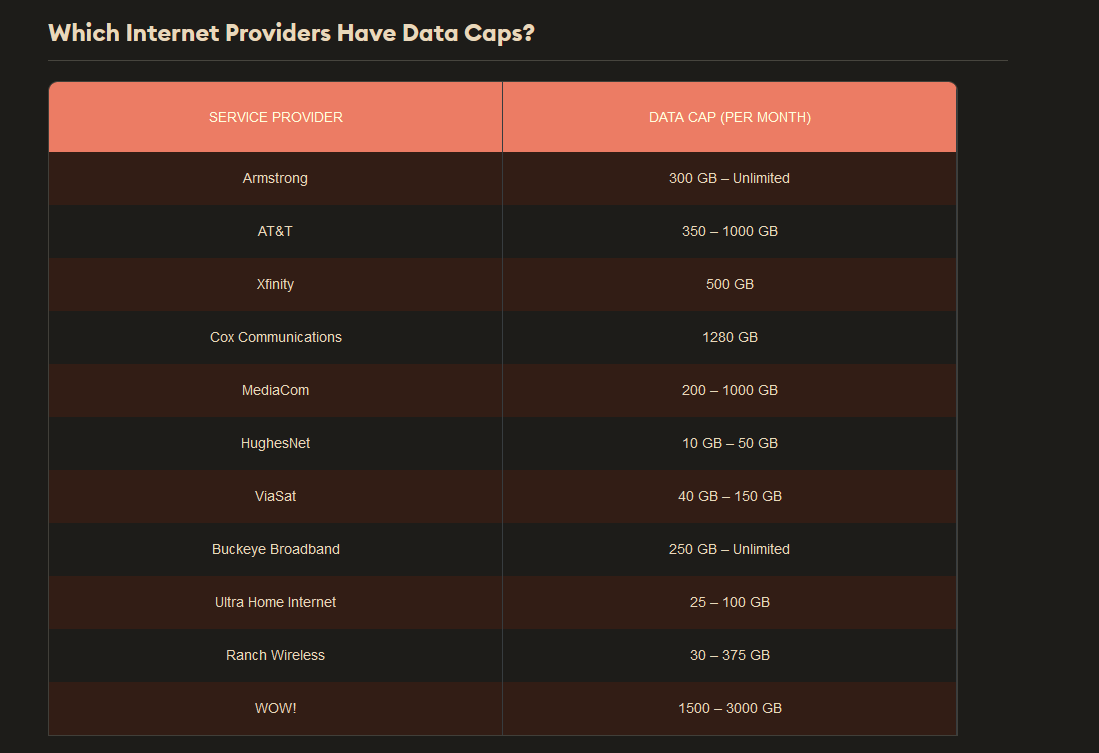Why do cell phones have a data limit but home internet doesn’t? I understand bandwidth limits, but how can home internet get away with giving users all the data they can use, but cell phone providers can’t?
cell phone providers can, they just won’t (would eat into their profits)
and most of the home internet sold as “unlimited” was a scam – if you started to get too close to some hidden value, they would start throttling your connection
Hm interesting, I’ve never run into issues with hidden throttling.
How would you know if it’s hidden?
Because I get my full speed
I wonder what that is? I’ve gone trough 300TB a month at one point
Home Internet usually doesn’t have unlimited internet. There’s usually caps baked in somewhere. Don’t believe me? Read the fine print. At some point, at some bandwidth usage in the monthly cycle, they will throttle the living crap out of your connection. It’s written into pretty much every contract I’ve ever signed, and I’ve been with over a dozen carriers of landline internet over the years.
The reason being that they don’t want you serving websites or business class functionality with residential level internet. They didn’t build their network with those constraints. They want you paying for and using the business internet package, which has dedicated bandwidth and no caps because you’re paying for a dedicated line to be run.
For mobile phones? Old pricing models still trying to be relevant. There’s no technical reason.
Home internet has unlimited internet
It’s not 2002
Well, maybe not in that…one… country
There’s “hard” caps, and there’s “soft” caps. When you hit the soft caps with many of these ISP’s, they start throttling your internet usage by a substantial amount.
Relevant Screenshot of caps as of Sept 2024.

I said “home internet hasn’t had data caps for a couple of decades, well except maybe in that one country where people have no consumer rights and everyone gets fucked up the arse for money just for existing”. I’m paraphrasing here.
You said - “Oh yeah, let me prove you right!”
I’m not sure where you’re going with this
Ok, I missed the sarcasm and allusion to the US as the country you were talking about. That’s fair.
I assumed the OP was asking the question for the US. Which of course, is the thing people in my country do. Assume everything is about us ;)
Weird how 97% of people don’t think that eh? 😂
Closer to 96/95% now ;) But yeah, your point stands. What’s even worse about this, is I’m working on a dual citizenship with Portugal, so I should have had more self-awareness than I showed ;)
Good luck! Everyone deserves unlimited internet and consumer rights!
I can only speak from a UK perspective, but most home ADSL/VDSL/Fibre providers don’t have limits, other than “if your usage is tanking the network, we’ll ask you to knock it off” type clauses.
Most providers are also signed up to an agreement that if your speed drops 50% below the agreed speed on the package on average, they’ll either give you refunds, or let you out of the contract.
The only ones that throttle are the bargain basement operators aimed at people who don’t care, and one otherwise very competent provider that for some unexplainable reason only gives 1TB by default, charging an extra £10 for 10TB.
And I guess there is also a pricing step up to guaranteed bandwidth. For business use, they tend to be things like 1gbits headline, 500mbit guaranteed burst, 100mbit guaranteed sustained.
I am in the US and I do not have a hard cap, and I regularly go WELL above the soft cap listed for my ISP in that image with no throttling.
deleted by creator
money.
data caps are coming to home internet soon too and with inescapable hidden contracts; switch to an independent isp to avoid it before you’re entrapped into one.
Ah yes I’ll just pick from one of the many ISPs in my area
they exist and they usually suck compared to something like comcast or at&t; but they’re much better than a $500 internet bill because you went over your limit or paying considerably more for breaking the contract that you didn’t know you signed when you didn’t read the fine print.
In a lot of places in the US there is only one home service provider.
i’m aware and fwiw; that’s where it’ll be implemented last since the people there are the biggest and best chance at pushing back against this successfully.
Lots of home internet does have a data cap, but you might not realize it. Typically what will happen is that, once you hit your cap, you’ll be rate throttled. That throttle might not affect most video streaming since Netflix is really good at video compression, but you’ll see the hit if you are, for instance, downloading large games from PSN, Steam, etc.
In theory at least it’s because you pay for a specific bandwidth for home internet (the size of the pipe) but a specific amount of data for cellular (how much stuff you can get through a fixed sized pipe).
Home internet is a little unique in that way, almost all other utilities are consumption based with no real tiers in terms of how it’s delivered (you pay for the volume of water or gas you use, electricity is the same, just different units).
Networking equipment gets more expensive based on the bandwidth it supports, but it doesn’t much care how many bits you push through it. So ISPs charge based on their capacity to deliver those bits, and provide tiers at different price points. Cellular though is much more bandwidth constrained due to the technologies (and it used to be much more so before LTE and 5G), so it didn’t makes sense to charge you for slow or slower tiers. Instead the limiting factor is the capacity of a tower so by limiting data to small amounts it naturally discourages use. That model carried forward even now that the technologies support broadband speeds in some cases. As such and ISP could provide the biggest pipe (highest speed) to all homes and just charge based on consumption (they used to in the days of dial up, and satellite before starlink always has). Many ISPs instead are now double dipping though and charging for both.
If my phone didn’t have a cap, I’d hotspot it all, which is basically the idea of cellular home internet routers. I found a home router without a cap, which time will tell to be true, but it’s still more expensive than my phone with a very large but not unlimited cap.
They want to get paid, that’s the reasoning. The amount of data is really irrelevant except for pricing.
Roaming fees used to be the same until EU stepped in. Hopefully EU will eventually step in and order a full stop to ALL CAPS too. We live in the “future” now, right? Bring me my free unlimited connection so I can download that car they talked about.
I have the opposite. Unlimited phone data, but it throttles above some high number that I’ve never hit. Capped home internet from crapcast, 1.3 TB, I haven’t hit it but I’ve come within a couple gigabytes.
They offer unlimited data if I use their modem/router for an extra $10/mo. Of course their modem comes with the wonderful feature of a public hotspot for any other Comcast customers in the area. I’ve been thinking about getting their modem, putting it in a metal box and just using pass through with my opnsense box.
Where are my Rogers home internet customers at? 🇨🇦
I moved to Telus when Rogers bought Shaw and screwed up my billing plan, and were unwilling to be competitive.
Both Rogers and Telus have capped plans and more expensive “unlimited” plans.
AOL used to be $19.95/mo for forty hours, then an additional charge per minute beyond that.
Oh god, taking me back to their stupid always-on-top timer on the screen. It was anxiety inducing. I’m so glad pay by the minute internet didn’t last, can you imagine??
I can. My phone bills were over $400 for a while in the early 90s. $400 in 1994 is worth over $850 today.
Neither my phone internet nor my home internet has a GB limit. The phone internet costs 25€ a month, and home internet 30€.
It is a proxy for don’t use too much on the busy towers. In small towns it doesn’t matter, but if you are in a downtown the tower will have many people connecting to it and the radio frequencies are shared. By putting a limit on everyone they force better sharing of that limited bandwidth. The limit is very large - far more that than the large abusers will use alone, but in a dense areas it is less than the common person will use all at once.
Tmoblie has (or had?) a binge on plan - if you used video (which we quickly figured out meant low quality - but probably good enough for a tiny phone screen) or audio you were using a lot of data, but it was consistent all day and so they didn’t have to count it - if the tower doesn’t have enough bandwidth for everyone on the first day of the month they have to fix that. That is the real worry: the tower running out of bandwidth on the first day of the month.
Some home Internet plans do. I’ve seen AT&T had in their terms that if you hit 99GB, they would throttle your speeds.
This was years ago, so not sure if that changed or not.
Satellite plans often had limits too because they didn’t want to encourage lots of usage on their satellites. I haven’t checked in a few years, but last I checked, these weren’t throttle limits either, sometimes they had hard limits where you just couldn’t connect anymore once you hit the limit.
They convinced the FCC, cellular networks are different than wired, and should have different rules.
My previous home line had a hard cap at 1TB per month. That seemed like a lot at the time, but I think as the internet grows and requires more bandwidth these “sky high” caps will feel smaller and smaller.







